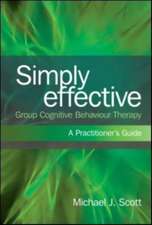Thinking about Thinking: Cognition, Science, and Psychotherapy
Autor Philip E. McDowellen Limba Engleză Hardback – 16 feb 2015
| Toate formatele și edițiile | Preț | Express |
|---|---|---|
| Paperback (1) | 459.35 lei 6-8 săpt. | |
| Taylor & Francis – 27 ian 2015 | 459.35 lei 6-8 săpt. | |
| Hardback (1) | 1186.14 lei 6-8 săpt. | |
| Taylor & Francis – 16 feb 2015 | 1186.14 lei 6-8 săpt. |
Preț: 1186.14 lei
Preț vechi: 1446.52 lei
-18% Nou
Puncte Express: 1779
Preț estimativ în valută:
226.96€ • 236.99$ • 187.42£
226.96€ • 236.99$ • 187.42£
Carte tipărită la comandă
Livrare economică 15-29 aprilie
Preluare comenzi: 021 569.72.76
Specificații
ISBN-13: 9781138823969
ISBN-10: 1138823961
Pagini: 274
Ilustrații: 20 black & white illustrations
Dimensiuni: 152 x 229 x 23 mm
Greutate: 1.1 kg
Ediția:1
Editura: Taylor & Francis
Colecția Routledge
Locul publicării:Oxford, United Kingdom
ISBN-10: 1138823961
Pagini: 274
Ilustrații: 20 black & white illustrations
Dimensiuni: 152 x 229 x 23 mm
Greutate: 1.1 kg
Ediția:1
Editura: Taylor & Francis
Colecția Routledge
Locul publicării:Oxford, United Kingdom
Public țintă
ProfessionalCuprins
1. Thinking About Psychology 2. Thinking About the Brain 3. Thinking About Emotions 4. Thinking About Thinking 5. Thinking About Our Selves 6. Thinking About Science and Contemporary Issues 7. Re-Thinking Psychotherapy
Recenzii
"Undoubtedly, the text can be of interest to novices who seek an engaging introduction to psychology and its most notable application (i.e., psychotherapy), and to a more specialized readership who may be attracted by the opportunity of a quick knowledge update." – Maura Pulotti, Ph.D., Ashford University, Metapsychology
"Thinking About Thinking: Cognition, Science, and Psychotherapy is an ambitious undertaking that explores the most fundamental of human attributes--thinking... This timely and important effort and the myriad of supporing neuropsychological, cognitive, and cultural studies challenge assumptions concerning the nature of our cognitive processes. The rich tapestry of evidence-based knowledge presented in the book depicts a complex picture of our thinking processes, illustrating both their potential capabilities as well as their ever-present pitfalls... McDowell's approach to diagnosing and treating patients' problems is active and directive... WE need this optimism, especially in a field where we attempt to offer patients alternatives to maladaptive behaviors. Although taking into account the stubborn difficulties created by the way our brains/minds work is necessary, following McDowell's model of exacting and science-based treatment can offer a great deal to alleviate suffering." - Efrat Ginot, private practice, New York, PsycCritiques
"Philip McDowell uses many vivid illustrations, colorful metaphors, and case examples to take us on a wild ride through the brain, emotions, and consciousness. These are valuable pathways to increased self-awareness and improved psychotherapy. This veteran psychotherapist encourages scientific thinking about the [non-ergodic] nature of psychotherapy for a wide audience of psychotherapists, students, academics, and others interested in human behavior and contemporary issues." – John L. Ford, Professor Emeritus, Cornell University
"McDowell leads the reader on a comprehensive and insightful journey to explore how our thought processes and brain functioning drive the human experience. He expertly weaves personal experience with a historical and contemporary perspective of research and theories into an understanding of our emotions, decision making, relationships, and society. It is a thought provoking book for anyone who is interested in appreciating what it means to be human." – Sam Rubenzahl, PhD, Rubenzahl, Knudsen & Associates Psychological Services
"The science of psychotherapy has made leaps in producing therapy practices that are effective and empirically validated. Yet, there is still the unspoken mystery of what makes the process of therapy work so well. The patient’s use of meta-cognition is essential part of the catalyst of change. Modern psychotherapies have provided the scaffolding to guide practitioners and patients through the journey towards health, but leave many questions still unanswered. Mr. McDowell’s work explores this mystery of meta-cognition and the internal human experience in the therapeutic process. It is a wonderful dialog of the dynamics of therapy within the framework of modern science." – Thomas E. Knudsen, Psy,D, ABPP, Rubenzahl, Knudsen & Associates Psychological Services, PC, Watertown, NY
"Thinking About Thinking: Cognition, Science, and Psychotherapy is an ambitious undertaking that explores the most fundamental of human attributes--thinking... This timely and important effort and the myriad of supporing neuropsychological, cognitive, and cultural studies challenge assumptions concerning the nature of our cognitive processes. The rich tapestry of evidence-based knowledge presented in the book depicts a complex picture of our thinking processes, illustrating both their potential capabilities as well as their ever-present pitfalls... McDowell's approach to diagnosing and treating patients' problems is active and directive... WE need this optimism, especially in a field where we attempt to offer patients alternatives to maladaptive behaviors. Although taking into account the stubborn difficulties created by the way our brains/minds work is necessary, following McDowell's model of exacting and science-based treatment can offer a great deal to alleviate suffering." - Efrat Ginot, private practice, New York, PsycCritiques
"Philip McDowell uses many vivid illustrations, colorful metaphors, and case examples to take us on a wild ride through the brain, emotions, and consciousness. These are valuable pathways to increased self-awareness and improved psychotherapy. This veteran psychotherapist encourages scientific thinking about the [non-ergodic] nature of psychotherapy for a wide audience of psychotherapists, students, academics, and others interested in human behavior and contemporary issues." – John L. Ford, Professor Emeritus, Cornell University
"McDowell leads the reader on a comprehensive and insightful journey to explore how our thought processes and brain functioning drive the human experience. He expertly weaves personal experience with a historical and contemporary perspective of research and theories into an understanding of our emotions, decision making, relationships, and society. It is a thought provoking book for anyone who is interested in appreciating what it means to be human." – Sam Rubenzahl, PhD, Rubenzahl, Knudsen & Associates Psychological Services
"The science of psychotherapy has made leaps in producing therapy practices that are effective and empirically validated. Yet, there is still the unspoken mystery of what makes the process of therapy work so well. The patient’s use of meta-cognition is essential part of the catalyst of change. Modern psychotherapies have provided the scaffolding to guide practitioners and patients through the journey towards health, but leave many questions still unanswered. Mr. McDowell’s work explores this mystery of meta-cognition and the internal human experience in the therapeutic process. It is a wonderful dialog of the dynamics of therapy within the framework of modern science." – Thomas E. Knudsen, Psy,D, ABPP, Rubenzahl, Knudsen & Associates Psychological Services, PC, Watertown, NY
Notă biografică
Philip E. McDowell, LCSW, has a private practice in Lowville, New York. He earned a Lifetime Achievement Award from the New York State Office of Mental Health in 2002.
Descriere
This book examines cognition with a broad and comprehensive approach. Drawing upon the work of many researchers, McDowell applies current scientific thinking to enhance the understanding of psychotherapy and other contemporary topics, including economics and healthcare. Through the use of practical examples, his analysis is accessible to a wide range of readers. In particular, clinicians, physicians, and mental health professionals will learn more about the thought processes through which they and their patients assess information.



















